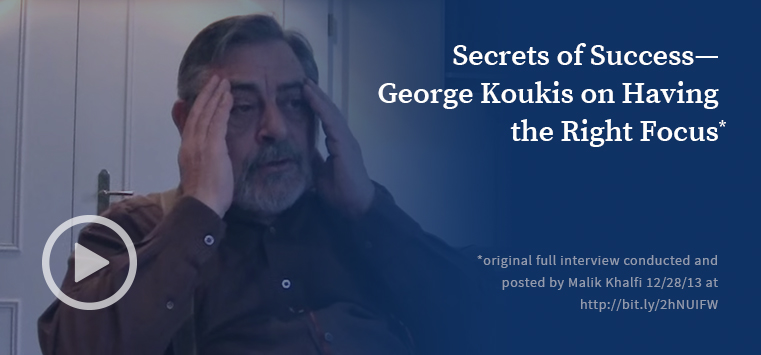
Having and Being
George Koukis Speaks Personally on
Why Leaders Must Be More to Have More
With this misplaced and myopic focus, what they fail to understand is that in the absence of first “becoming more,” anything material they believe they have gained is merely illusion—a mirage, or “false image” created by distortions of light, tricking us into seeing something that is not actually there.
By way of illustrating this co-dependency between “having” and “being” I will recount to you the event I have pinpointed as teaching me the most important lesson of my life—an event I have referred to often based on its depth of truth and the degree to which it changed my focus and path in every moment since it happened.
As I have recounted before, after receiving my diploma from the University of Technology Sydney and coming quickly through the ranks at Qantas following what I refer to as my “Me Do It!” moment, I joined Management Science America (MSA) in their recently opened Sydney office, where for six years I worked very hard—moving from consultant to Pre-Sales Manager, to Operations Manager, to General Manager, and finally Managing Director.
My business successes were significant enough that almost no one who knew where I had started could have predicted them. But I had worked hard and prevailed. So by the time I left MSA to open my own consulting company, I was luxuriating, if you will, in the fruits of my labor. I had moved my family to a lovely home in Hunter’s Hill on the North Shore in Sydney, became a member of the Sydney Opera House, and began to cultivate a number of hobbies that happened to include squash.
The squash turned out to be important because three friends I had on the team were investing very heavily in the stock market at the time—it was booming. They were fixated on how much money they were making, and talked about little else. They strongly encouraged me to participate, and although I knew nothing of the workings of the stock market—and they seemed unable to provide any pertinent details beyond “everyone is making money”—I invested as well.
Each week, we all bought more shares, and everything continued to go up and up—we never sold any of the stocks we’d purchased, and on paper the money we were making was unbelievable—astronomical. We kept looking at those numbers—the “money we were making”—or so we believed at the time—and it was dizzying. We invested every asset we had access to in order to “make more” of this money.
In this imaginary reality we had constructed, it seemed almost magical. To give a clear picture of the mindset we were in, I will tell you that after exhausting all of my family’s liquid assets, I mortgaged our home to invest more money in the market.
Of course you are smart—you can see exactly what is coming in this story—just as we who were actors in it could not. Within three months, the stock market crashed, and I had lost everything of material value my family had—the house, the cars, our daughters’ school tuition, and our savings, which had at that point been built up to a comfortable point. I relate this very personal story because it is a nearly perfect illustration of the concept of having and being.
We lost everything because it was never really ours. The lure of “making money”—when in fact we had “made” nothing of value to justify those rewards—became distracting and then intoxicating to us until we lost all ability to make prudent judgments. It is as Aristotle says of those unable to behave with moderation or temperance.
“For the longing for pleasure is insatiable and bombards from all sides someone who lacks sense; the activity of the desire increases the innate desire … and if the desires are great and intense, they drive out calculation.”
I tell this story now because since that moment in time—when we went back to nothing and literally started over—this concept has been burned into every fiber of my being. Because my focus was misplaced in this instance—because my primary objective was to make money, as its own end, and to “have more” without creating any sort of value or “becoming more” myself—any “gain” I thought I had seen was in fact never there in reality. And while this was an uncommonly dramatic illustration of the point, it remains my greatest life lesson, and one I know with certainty will never be repeated.
Since the time of this event, I have focused my thoughts and energies only on things of value—things of integrity—whether those things are in business, out in the world, or just interacting with one individual human being. And what has resulted from this focus on “being more”? I have been materially repaid in multiples—many times over. In seeking to become more, I have been granted more than I ever could have imagined.
Practical Application for Ethical Leadership
Shattering the Material Illusion—Why Having More Depends on Being More



